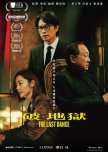Souls trapped in the human realm, unable to move on
As much as I hate to admit it, it was the movie adaption of John Green's The Fault in our Stars that taught me, "Funerals... are not for the dead. They are for the living."
From watching the trailer, I thought this film would be presented in clashes of dichotomies: death vs life, tradition vs modernity, religion vs industry. And while all these themes do surface in the film, they don't do so as mutually exclusive dichotomies. Instead, the richness of The Last Dance comes from the intersections and overlap of these themes.
The story structure itself is neat. There are three parts and the narrative comes fulls circle, starting and ending with the Taoist funeral ritual of Breaking Hell's Gate. The cinematography of the ritual scenes alone could carry the film if needed. But the bulk of the film is what provides the emotional impact of these scenes.
The strength of this film is its messiness. And the messiness is found at the intersections. Tradition and modernity don't so much clash with one another as grasp out to one another, trying to find purchase, albeit sometimes in awkward or painful ways. This doesn't only play out in the funeral home between the male leads. The friction and fondness also happens within the family home as the characters try to figure out how religion features in their own identities and how it impacts their relationships with one another. There is also just enough wry humour – mostly from Dayo Wong's character – to provide breathing space (pun intended).
Unsurprisingly, there is a lot of death in this film. Despite the music being a tad heavy-handed at times, these are emotionally deep touch points. Each death progresses the narrative and also reveals some new aspect to the intersecting themes of the film.
To bring this review back to full circle, The Last Dance itself is for the living. Perhaps this is why we don't ever get to see any of the deceased characters on screen alive. The film is *about* the living because it is *for* the living. After all, no one gets to see their own funeral.
NB: "Souls trapped in the human realm / Unable to move on" are the translated lyrics of Terence Lam's song 普渡眾生 which plays during the credits.
From watching the trailer, I thought this film would be presented in clashes of dichotomies: death vs life, tradition vs modernity, religion vs industry. And while all these themes do surface in the film, they don't do so as mutually exclusive dichotomies. Instead, the richness of The Last Dance comes from the intersections and overlap of these themes.
The story structure itself is neat. There are three parts and the narrative comes fulls circle, starting and ending with the Taoist funeral ritual of Breaking Hell's Gate. The cinematography of the ritual scenes alone could carry the film if needed. But the bulk of the film is what provides the emotional impact of these scenes.
The strength of this film is its messiness. And the messiness is found at the intersections. Tradition and modernity don't so much clash with one another as grasp out to one another, trying to find purchase, albeit sometimes in awkward or painful ways. This doesn't only play out in the funeral home between the male leads. The friction and fondness also happens within the family home as the characters try to figure out how religion features in their own identities and how it impacts their relationships with one another. There is also just enough wry humour – mostly from Dayo Wong's character – to provide breathing space (pun intended).
Unsurprisingly, there is a lot of death in this film. Despite the music being a tad heavy-handed at times, these are emotionally deep touch points. Each death progresses the narrative and also reveals some new aspect to the intersecting themes of the film.
To bring this review back to full circle, The Last Dance itself is for the living. Perhaps this is why we don't ever get to see any of the deceased characters on screen alive. The film is *about* the living because it is *for* the living. After all, no one gets to see their own funeral.
NB: "Souls trapped in the human realm / Unable to move on" are the translated lyrics of Terence Lam's song 普渡眾生 which plays during the credits.
Cet avis était-il utile?





